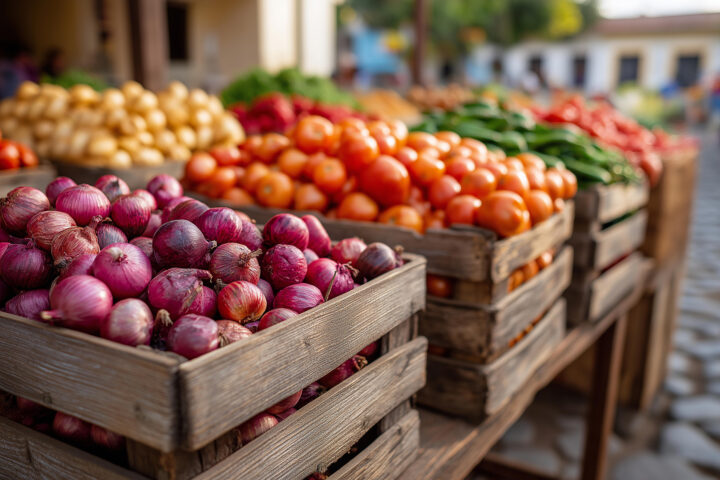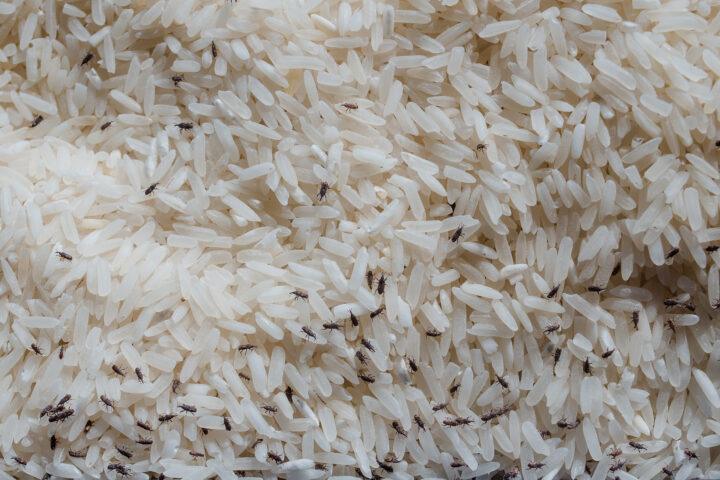
Key answers at a glance
Plant protection products and biocides have proven their worth. They not only enable regional food production, but also limit food loss and food waste. Here are ten questions and answers on pesticides and plant protection products.
Wednesday, January 29, 2020
In brief:
- Pesticides protect plants and food from diseases and pests.
- They prevent crop losses and enable resource-efficient production as well as hygienic food processing.
- This benefits the environment, the climate, and public health.
Without pesticides, regional production is endangered and imports increase. Pesticides also include biocides, which control pests in livestock farming and along the processing chain or are used as cleaning agents and disinfectants. The responsible use of pesticides and biocides has many advantages.
1 No regional production without pesticides
Without protection against pests and diseases, Swiss farmers cannot meet the demand for regional products. The supply of regional products would fall sharply, and dependence on climate-damaging imports would increase. An analysis by the European Parliament's Scientific Service (EPRS) estimates that without the use of plant protection products, yields would fall by 40 percent for maize and by as much as 60 percent for potatoes.
2 Higher prices without pesticides
Without pesticides, harvest yields fall. If demand remains the same, the price of regional agricultural products will therefore rise. In Switzerland, organic products cost around 50 percent more than products from modern, resource-efficient agriculture. This is because organic farming is significantly more labour-intensive. Weeds have to be controlled mechanically or even weeded by hand. As a result, the number of hours required per area cultivated is massively higher. In 2017, 19,600 ha of organic beet required 80 hours of work. For 20 ha of organic beet, 260 hours of work were required.
3 More climate damage without pesticides
If no pesticides are used, more land is needed to produce the same harvest. Arable farming without herbicides requires more mechanical tillage (higher energy consumption, more erosion). In addition, the tilled soil releases more CO2. Studies from Germany show: Including indirect greenhouse gas emissions, organic farming converts about 147 kg of CO2 equivalents per unit of grain produced. Conventional farming, on the other hand, comes to just about a quarter of that level (34 kg CO2 equivalents).
4 More imports without pesticides
Calculations by the Food and Agriculture Organization of the United Nations (FAO) assume a drop in yield of up to 40 percent if no modern crop protection is used. These estimates also apply to Switzerland. In the case of special crops such as vines, fruit, potatoes and vegetables, total losses would have to be expected. Crop protection products not only help to achieve higher yields, they also reduce crop losses during pre-processing, transport and storage, where additional losses of up to 40 percent can occur. High crop losses are environmentally unsustainable and they ultimately increase imports and foreign dependence in the food sector.
5 More Food Waste Without Pesticides
Food Waste starts in the field. Protecting agricultural crops is a crucial factor when it comes to avoiding crop losses. Also, unblemished produce has a better shelf life. Food with fungal infestation cannot be processed or sold for food safety reasons. Untreated products lose their shape, colour and flavour, soon become inedible and end up in the bin. The use of pesticides increases the quality of agricultural products and reduces unethical food waste."
6 Less quality without pesticides
If food makes a dull impression in the shop, it will not be bought. Consumers choose products of impeccable quality when they buy them. This is only possible with targeted crop protection. Only with the use of modern crop protection products is it possible to guarantee and maintain the quality level of our agricultural products. Without plant protection, the quality and shelf life of the goods on offer will decline. That is why organic products are also dependent on plant protection products. [8] [9]
7 Less safe food without pesticides
Without pesticides, crops can contain potentially dangerous contaminants. Examples are carcinogenic mycotoxins (fungal toxins) or unintentionally harvested poisonous weeds. Such hazards can be reliably prevented by the use of fungicides and herbicides. Biocides (belonging to the pesticides) such as cleaning agents and disinfectants are also indispensable for hygienic food processing. Their use in the food sector plays an important role in ensuring hygiene along the distribution chains to the consumer. Biocides counteract premature spoilage and contamination with undesirable microorganisms and pathogens as well as pests. Biocides are also used to treat drinking water.
8 No regional specialities without pesticides
Without the targeted use of pesticides, Swiss wine would be almost inconceivable. The fact is that in both organic and conventional viticulture, plant protection products are used in our latitudes. Without chemical-synthetic plant protection, it is difficult to grow rape, which is why only two percent of rape cultivation in Switzerland relies on organic plant protection. All in all, if you want regional products from Switzerland, you cannot completely reject pesticides.
9 Without pesticides, the degree of self-sufficiency continues to fall
The net self-sufficiency rate for agricultural products in Switzerland is 51 percent. If pesticides are greatly reduced or dispensed with, the yields of Swiss agriculture will decline massively. Switzerland's degree of self-sufficiency is falling. For table potatoes, a loss of 40 percent is expected, for winter wheat a loss of 35 percent and for sugar beets the yield is also about 40 percent lower if conventional plant protection products are abandoned.
10 Without pesticides, Swiss farmers have no future
Crop protection products help farmers to achieve a good harvest. Crop failures, on the other hand, mean a loss of income. Crop protection products are therefore a kind of insurance for agricultural income. Farmers - just like any other profession - cannot simply cope with wage losses of several 10%. Through the sensible and professional use of crop protection products and other technologies, farmers see a future and the farming profession remains attractive to young, motivated farmers. Without crop protection products, farmers' incomes drop massively.
Big challenges
The challenges for farmers to produce enough safe and affordable food in a sustainable way are great. Alain Gaume, Head of Plant Protection Research at Agroscope, gives an overview and outlines possible solutions.
"As little as possible - as much as necessary"
Pesticides pose risks if used improperly. They must be used professionally, otherwise water bodies and soils can be polluted. Professional application is guided by the motto "as little as possible, as much as necessary". However, the public is dominated by simple black-and-white thinking: organic is good, chemical pesticides are bad. The reality is more complex. Responsible crop protection cannot be squeezed into simple schemes. The copper products that organic farmers use against late blight in potatoes are synthetically produced and contain heavy metals that accumulate in the soil and are toxic to earthworms. They also have the potential to endanger water bodies. But the conventional alternative cyazofamid can also endanger water bodies. However, unlike the biological agent, the conventional pesticide degrades. Ultimately, there are no easy answers. Regional food production will need protection in the future as well. Careful use of plant protection products is indispensable. The fact is: they are products of intensive research that have gone through a strict approval process. Biocides and plant protection products are indispensable.
Related articles

Why cutting out synthetic pesticides will reduce food production
The UK’s action plan to reduce pesticide use could backfire, warns agronomist Greg Dawson: overly strict regulations may make domestic farming unprofitable – and increase the United Kingdom’s dependence on imports.

Approval studies for plant protection products are science-based
The approval of plant protection products in Switzerland is subject to strict legal requirements. Ultimately, this approval process is based on scientifically sound studies. These studies are financed by manufacturers, but they must comply with clearly defined governmental requirements and controls. The aim is to ensure reliability and independence.

Grain beetle eats its way through Swiss grain stores
The grain beetle is spreading in Swiss grain stores. Introduced via international trade, it threatens harvests and impairs food quality.

New problem: soft bugs, native pests discover fruit and vegetables
Soft bugs are spreading at lightning speed in fields and greenhouses in southern Germany. These pests are destroying fruit and vegetables and pushing agriculture to its limits. Effective plant protection products must be found urgently to safeguard harvests.

